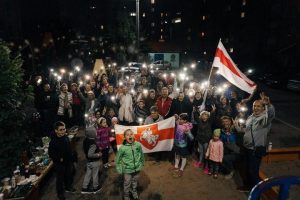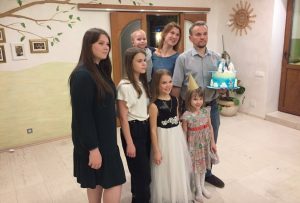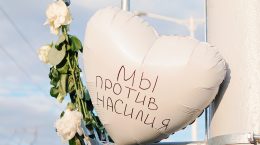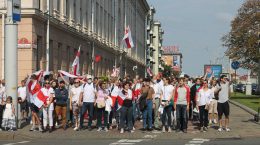Olga Zolotar became known in Belarus in August 2020 thanks to her volunteering near the temporary detention center on Akrestsina. In March, a resident of the agro-town Zhdanovichi, Minsk district, was recalled again – a criminal case under Article 361 of the Criminal Code was brought against her. Olga is now in Detention Centre No 1, her husband is serving a sentence for a white-red-white flag on a window, and her five children – aged from four to 17 – are left with their grandmother. It is not known whether they will see their mother in the next five years.
Olga Zolotar is a master of sociology and an election observer
 She is 38 years old. She studied in the history class of the BSU Lyceum, graduated from the Faculty of Philosophy and Social Sciences of the BSU, and has a Master’s degree in Sociology. Speaks exclusively in Belarusian. Her friends recall that she loved travelling around Belarus, visiting theatres and museums, and was always interested in the social life of Belarus. And she also went to the church, which was an integral part of her life.
She is 38 years old. She studied in the history class of the BSU Lyceum, graduated from the Faculty of Philosophy and Social Sciences of the BSU, and has a Master’s degree in Sociology. Speaks exclusively in Belarusian. Her friends recall that she loved travelling around Belarus, visiting theatres and museums, and was always interested in the social life of Belarus. And she also went to the church, which was an integral part of her life.
Olga’s husband’s name is Sergei Gankevich, he is an economist by education, but now he is in the paint business. Unlike his wife, Sergei was not interested in social activities, but he was sympathetic to Olga’s choice and supported her. The family has five children: the eldest daughter is 17 and the youngest child, a boy, is 4.
 In the summer of 2020, the family was actively involved in protest activities but mostly Olga. She signed up as an independent observer at a polling station in Zhdanovichi, but she was not allowed there. After the violent crackdown on the protests in the first days after the elections, Olga took up volunteering and spent time near the detention centre on Akrestsina. Despite the enormous stress of the first days of the protests, the woman found the strength to communicate with everyone leaving the detention facility, to joke and support people.[1]
In the summer of 2020, the family was actively involved in protest activities but mostly Olga. She signed up as an independent observer at a polling station in Zhdanovichi, but she was not allowed there. After the violent crackdown on the protests in the first days after the elections, Olga took up volunteering and spent time near the detention centre on Akrestsina. Despite the enormous stress of the first days of the protests, the woman found the strength to communicate with everyone leaving the detention facility, to joke and support people.[1]
Volunteering for Okrestin did not end with Olga’s activities: she soon joined the work of trial observers. Of course, she did not manage to get to all the courts, and then she actively wrote complaints about violations by the judicial system. In their native Zhdanovichi, the family has a two-story house of its own and in it yard Olga began to organize tea parties and invite neighbors.[2]
Four arrests of Olga Zolotar
 For the first time, a protocol for a woman was drawn up in the fall. On September 10, residents of one of the courtyards in the agricultural town of Zhdanovichi held a tea party with white-red-white flags. After the gatherings, their participants began to be detained. Olga was no exception. The court imposed a fine on her under Article 23.34 of the Administrative Code for participating in an unauthorized event. Moreover, Olga herself said that in the picture from the tea party, which served as the basis for the detention, she is not visible.[3]
For the first time, a protocol for a woman was drawn up in the fall. On September 10, residents of one of the courtyards in the agricultural town of Zhdanovichi held a tea party with white-red-white flags. After the gatherings, their participants began to be detained. Olga was no exception. The court imposed a fine on her under Article 23.34 of the Administrative Code for participating in an unauthorized event. Moreover, Olga herself said that in the picture from the tea party, which served as the basis for the detention, she is not visible.[3]
Olga was arrested for the second time on January 28. She washed the paint from the smeared image of Pavel Latushko on the switchboard. She was charged under Article 17.1 of the Code of Administrative Offences (disorderly conduct). Olga’s report stated that she had “washed the top paint off the painted portrait, thus grossly violating public order and showing obvious disrespect for the public”. By the way, the trial in this case never took place.[4]
A few days later, on January 31, Olga Zolotar was detained again. This time she was sent to the detention centre on Akrestsina for two days. On Independence Avenue in Minsk, she was approached by the police and asked to go to the police station until the circumstances were clarified. Police explained their interest in her identity by the fact that she was carrying a bag from the “Neighbours” shop and a mask on her face. People with such description had allegedly organised an unauthorised picket.
 On Akrestsina, Olga tried to ask for bedding and hygiene items she was legally entitled to, but was answered with a succinct “all questions to the superiors”. However, the authorities were never there, and the Red Cross, which supplies the prisoners with items, appeared to bring everything on request when they were allowed. There were 16 people in a six-person cell and the lights were on all day. The prisoners were not given food or water. In the cell, everyone supported each other, told stories, sang songs, and did exercises together. After 48 hours in the TDF, Olga was tried and fined 50 basic units under Article 23.34.[5]
On Akrestsina, Olga tried to ask for bedding and hygiene items she was legally entitled to, but was answered with a succinct “all questions to the superiors”. However, the authorities were never there, and the Red Cross, which supplies the prisoners with items, appeared to bring everything on request when they were allowed. There were 16 people in a six-person cell and the lights were on all day. The prisoners were not given food or water. In the cell, everyone supported each other, told stories, sang songs, and did exercises together. After 48 hours in the TDF, Olga was tried and fined 50 basic units under Article 23.34.[5]
For the fourth time, Olga was detained on March 18, the day before she and her husband were going to go to Turkey on vacation. The arrest was preceded by an inspection visit to the family who were checking the children’s living conditions. On March 18, Olga took her daughter to dulcimer lessons at a music school. Employees of the Main Directorate for Combating Organized Crime and Corruption turned her car around, and after a search in her house, they took her to the detention center. Sergei was at work at that time. The woman’s ten-year-old daughter was left alone at home.[6]
Shattered family
 During a search in Olga’s house, a white-red-white flag was found in the children’s room. On 19 March, the woman’s husband, Sergei, was punished for it. The protocol indicated that on March 18 at 13.50, in the window of a private house, Sergei hung an unregistered flag for public viewing and thus held a picket. At the same time, Sergei arrived from work only at 14.30, and during the picket only his daughter was at home. At 11 p.m. he was summoned to the police station, ostensibly for questioning. There he learned of a report under Article 24.23 of the Code of Administrative Offences.
During a search in Olga’s house, a white-red-white flag was found in the children’s room. On 19 March, the woman’s husband, Sergei, was punished for it. The protocol indicated that on March 18 at 13.50, in the window of a private house, Sergei hung an unregistered flag for public viewing and thus held a picket. At the same time, Sergei arrived from work only at 14.30, and during the picket only his daughter was at home. At 11 p.m. he was summoned to the police station, ostensibly for questioning. There he learned of a report under Article 24.23 of the Code of Administrative Offences.
At the trial, Sergei said that they never had flags at home. In addition, the protocol stated that the “picket” took place in house 58, and the family of Olga and Sergei lived in house 56. The witness, police officer Pavel Yukhimenko, said that it was a technical mistake. By the way, even if the flag was hanging in the window of the first floor, no one would be able to see it from the street, the fence around the house is higher than 2 meters. The policeman said that, jumping up, he saw the windows of the first floor.
Olga’s mother also confirmed that the family did not keep white-red-white flags in the house. She explained this by the fact that Sergei is apolitical and that he needs to feed his family. The judge did not take into account the errors in the protocol and sentenced Sergei to 10 days in prison. Five children remained under the care of their grandmother.[7] The competent authorities will have to determine whether the spouses have coped well with the responsibilities of the parents.
The investigation’s version – what are Olga’s prospects?
According to the deputy head of the Minsk police department, head of the public security police Sergei Udodov, Olga Zolotar organized protest actions in Zhdanovichi. Also, the woman, according to the representative of the police department, was the administrator of the local chat and, since the summer of 2020, has organized unauthorized mass actions: tea drinking, walks and concerts.
“Repeatedly, the Zhdanovichi police department and line 102 received complaints from local residents that participants in unauthorized mass events interfere with comfort and rest. Each time, as soon as they saw the police officers, the “shareholders” removed all the protest symbols and said they had simply gathered to “chat” or “have tea,” but after the law enforcers left, local chat rooms actively posted pictures of participants “drinking tea” surrounded by protest symbols, which, incidentally, were also “decorated” in the yard of the couple,” the report says. The Ministry of Internal Affairs added that the detainee was brought to administrative responsibility several times.
Article 361 of the Criminal Code (calling for actions aimed at harming the national security of the Republic of Belarus) was not presented to Olga until four days after her detention. Maria Kalesnikava, Ilia Salei and Maxim Znak are in jail under the same article. Pavel Latushko has also been charged in absentia under this article and is on the international wanted list. The penalty under this article is up to five years’ imprisonment.
[1]https://charter97.org/ru/news/2021/3/23/415857/
[2]https://news.tut.by/society/723332.html
[3]https://news.tut.by/society/701065.html
[4]http://spring96.org/ru/news/102531
[5]https://euroradio.fm/ru/muzh-govorit-detyam-pravdu-istoriya-mamy-pyateryh-detey-pobyvavshey-na-okrestina
[6]https://www.currenttime.tv/a/belarus-zolotar-delo/31163988.html







